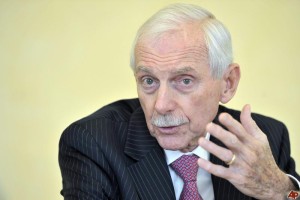The world to become more diverse – IOM
World leaders must prepare for more diversity as aging societies in the developed world and endemic youth unemployment in the developing world drive demographic trends, according to the head of the International Organization for Migration (IOM).
Speaking at a meeting on migration in Cairo recently, IOM Director-General William Lacy Swing said northern societies needed workers while “we have a youthful, largely unemployed global south, with young people needing jobs”.
He said the world was bound to become more diverse in terms of culture, ethnicity and religion.
 “Leaders who are not preparing their people for this, through public education, public information, and awareness-raising campaigns, just may not be doing their job,” Mr Swing said.
“Leaders who are not preparing their people for this, through public education, public information, and awareness-raising campaigns, just may not be doing their job,” Mr Swing said.
The IOM is a British-based organisation which works with governments around the world to to promote humane and orderly migration.
Mr Swing’s comments come as Europe faces its biggest migration crisis since the Second World War, with thousands of refugees pouring into every day from war-torn countries in the Middle East and Africa.
More than half a million have arrived by sea in Greece this year and the rate of arrivals is rising with over 8,000 coming on Monday alone in a rush to beat the onset of freezing winter, the United Nations said on Tuesday.
In all, more than 643,000 refugees and migrants from the Middle East, Africa and Asia have crossed the Mediterranean to Europe this year and at least 3,135 have died en route, according to the U.N. High Commissioner for Refugees.
Germany in particular – which has agreed to accept around one million asylum seekers this year alone – has open to accepting migrants into their society.
But others have shut their borders or imposed daily limits on numbers, saying they can’t cope with the massive influx entering the country.
Last month, the EU approved plans to relocate 160,000 asylum seekers from overstretched frontline states Italy and Greece with a compulsory quota system that was fiercely opposed by some eastern, more hardline members of the bloc.
The plan requires most of the 28 member states accept a share of those people over the course of two years.
But so far, only 19 Eritrean asylum seekers have been relocated from Italy to Sweden although another 100 people are due to be flown to other cities in the coming days.
Out of the 23 member states that are legally required to admit a share of the human burden, only six have offered immediate places so far – Austria, France, Germany, Luxembourg, Spain and Sweden, the source said.
Member states have also been slow to follow up with promised financial help – out of the €2.8billion pledged at an emergency EU summit on September 23, only about €474million has materialised.
In a related development, the EU’s border agency said member states had provided less than half of the personnel it had requested to help out in overstretched locations in Greece and Italy.
Laurie Nowell
AMES Australia Senior Journalist












